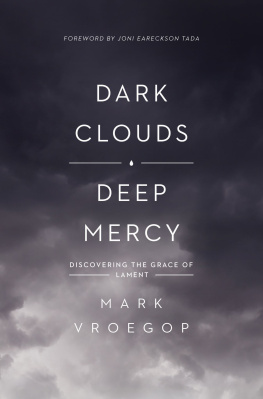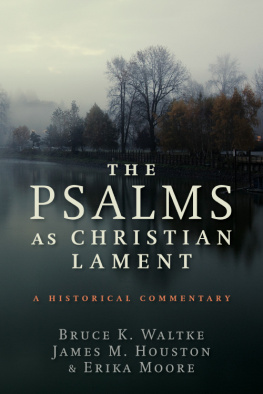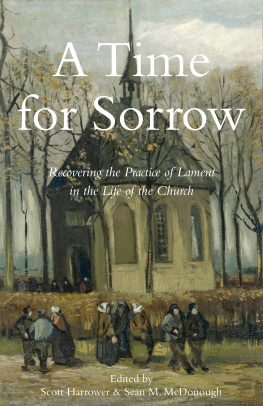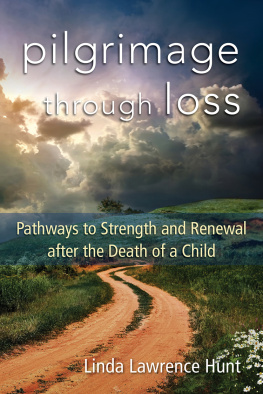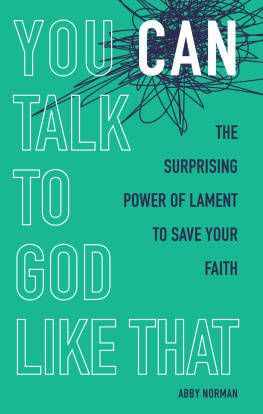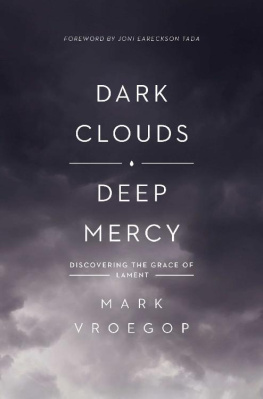Table of Contents
Landmarks
Lamentations 3
We may hear our hearts say, Its hopeless! but we should argue back.
Timothy Keller
While attending a meeting at a Christian conference center, I noticed a picture on the wall. It featured a painted scene of a small English cottage tucked between two mountains with a flowing stream. A small garden surrounded the house. It resembled a Thomas Kinkade painting with pastel colors, soft lines, and a bright skythe kind of art youd find in a Christian bookstore. This soothing refuge would be a place Id love to visitone of peace and tranquility.
Below the painting was Lamentations 3:2223:
The steadfast love of the Lord never ceases;
his mercies never come to an end;
they are new every morning;
great is your faithfulness.
The artist connected this famous verse to the idealized scene. I would guess many Christians would do the same.
But theyd be wrong.
A pastel -c olored cottage by a stream is not the scene of the third chapter of Lamentations. On the contrary, Jeremiah writes his mercies are new every morning over a dark and tragic landscape. Instead of an English cottage, the city of Jerusalem lay in ruins. Think Indonesia after a tsunami, not a cabin in the Smokies. Bright skies are replaced with looming dark clouds. Quaint gardens are exchanged for streets of suffering. Instead of a peaceful scene, its a war zone. Yet, as Jeremiah laments this destruction, he still says, The steadfast love of the Lord never ceases.
That changes how we read Lamentations 3:2223. Or at least it should. And it gives us a second lesson we can learn from lament.
Lamentation 3: Pointing the Heart to Truth
Jeremiah doesnt merely lament his pain and disappointment. He uses his song of sorrow to point his heart toward what he knows to be true despite what he sees. In effect, he says, Even in the leveling of Jerusalem, God is still in control. Despite the destruction of Judah, his mercies never come to an end. Gods faithfulness is still great.
This is where biblical lament is transformative. It not only gives voice to the pain you feel but also anchors your heart to truths you believeor are trying to believe when dark clouds linger. Something bad may have happened in your life, which is why you are reading this book. Whatever the reason, loss can feel like a wasteland. Its devastating. But lament helps us to rehearse biblical truth so hope will return. Despite what you see, despite what you feel, despite what you think, lament can be a supply of grace as you affirm that Gods mercies are new every day.
As you rehearse what is true, hope can rise. I promise. God promises too.
Two Different Perspectives in the Same Chapter
Everything in This is the summit of the book.
Lamentations reaches its crescendo with two contrasting sections on hardship. The change in tone is dramatic. Let me illustrate this with two representative verses:
My endurance has perished,
so has my hope from the Lord . (Lam. 3:18)
You have taken up my cause, O Lord;
you have redeemed my life. (Lam. 3:58)
Do you see the clear contrast? The first part of Lamentations 3 (vv. 120) is dark and hopeless, while the second part (vv. 2166) reflects an emerging level of trust. Lets explore this to see what we can learn.
No Hope
In Lamentations 3:18, Jeremiah sounds like hes given up: Its over. Theres no hope. Ever been there? I have. And Im sure you have too. There is an amplification of the pain he feels. In the first five verses we get a sense of his struggle:
I am the man who has seen affliction
under the rod of his wrath;
he has driven and brought me
into darkness without any light;
surely against me he turns his hand
again and again the whole day long.
He has made my flesh and my skin waste away;
he has broken my bones;
he has besieged and enveloped me
with bitterness and tribulation. (Lam. 3:15 )
The suffering has become personal and overwhelming. There seems to be no peace or happiness, no endurance or hope (Lam. 3:1718). The grief of the moment is relentless. Jeremiah has reached the bottom.
This is one reason why I love Lamentations. Its gutsy honesty and emotional rawness are refreshing. Ive lived what Jeremiah is feeling. Ive felt the hopelessness of grief and the weary uncertainty of Gods purposes. Ive wrestled with Gods plan. It helps me to know that Im not alone in that struggle. I hope you feel the same.
Perhaps you picked up this book and read this far while thinking, Ive got no faith. Im on empty. Im not sure I can trust God anymore. Lamentations 3:20 is for you:
My soul continually remembers it [the affliction]
and is bowed down within me.
This verse is in the Bible for a reason. The good news is that if youre at the bottom, God can meet you there.
Lament is the language of those stumbling in their journey to find mercy in dark clouds.
You Have Taken Up My Cause, O Lord!
However, the perspective changes. As honest as Jeremiah is with his pain, he does not stay there. In the same way that the Psalms move us from complaint toward trust, Jeremiah embraces a completely different perspective. The city is still destroyed. The people are still in pain. But something has changed.
I called on your name, O Lord ,
from the depths of the pit;
you heard my plea, Do not close
your ear to my cry for help!
You came near when I called on you;
you said, Do not fear!
You have taken up my cause, O Lord;
you have redeemed my life. (Lam. 3:5558 )
Do you hear the difference? Theres still suffering and struggle, but the tone is different. That leads us to a critical question, one that is central to the spiritual value of lament: What changed? Or maybe the question is more personal for you: How can my perspective change?
Dare to Hope
Lamentations 3:21 is the key. It is what we learned by looking at the Psalms. Laments turn on words like yet and but . Here is what Jeremiah says:
But this I call to mind,
and therefore I have hope. (Lam. 3:21)
In the New Living Translation, verse 21 reads,
Yet I still dare to hope
when I remember this.
This helps us get to the heart of a valuable lesson. The destruction of Jerusalem sends a message, but it is not the entire story. The phrase call to mind (ESV) or remember (NLT) uses Hebrew words focused on the heart or the essence of ones being. In other words, Jeremiah is drawing from the very center of what he believes. He uses his theology and what he believes as the basis for hope. He dares to hope again.
This is the pivot point in chapter 3 and the bridge between its two sections. It is the critical shift toward bold requests and choosing to trust that we learned through the lament psalms. On a personal level, this also could be a turning point for you. In fact, I hope once you see this, youll embrace the value of lament as not only an expression of your heart but also something to help you think differently.
Lament dares to hope while life is hard.
As we put lament into practice and as we choose to rehearse what we believe, we learn to walk by faith. Connecting faith to lament in his book Lament for a Son , Nicolas
Lament is a prayer of faith despite your fear.
I want you to learn from this shift in mind -s et . Lamentations shows us that hope does not come from a change of circumstances. Rather, it comes from what you know to be true despite the situation in front of you. In other words, you live through suffering by what you believe, not by what you see or feel. While the circumstances of life have a narrative to them, theres a biblical narrative underneath. Tim Keller, in his book Walking with God through Pain and Suffering , illustrates this for us:

